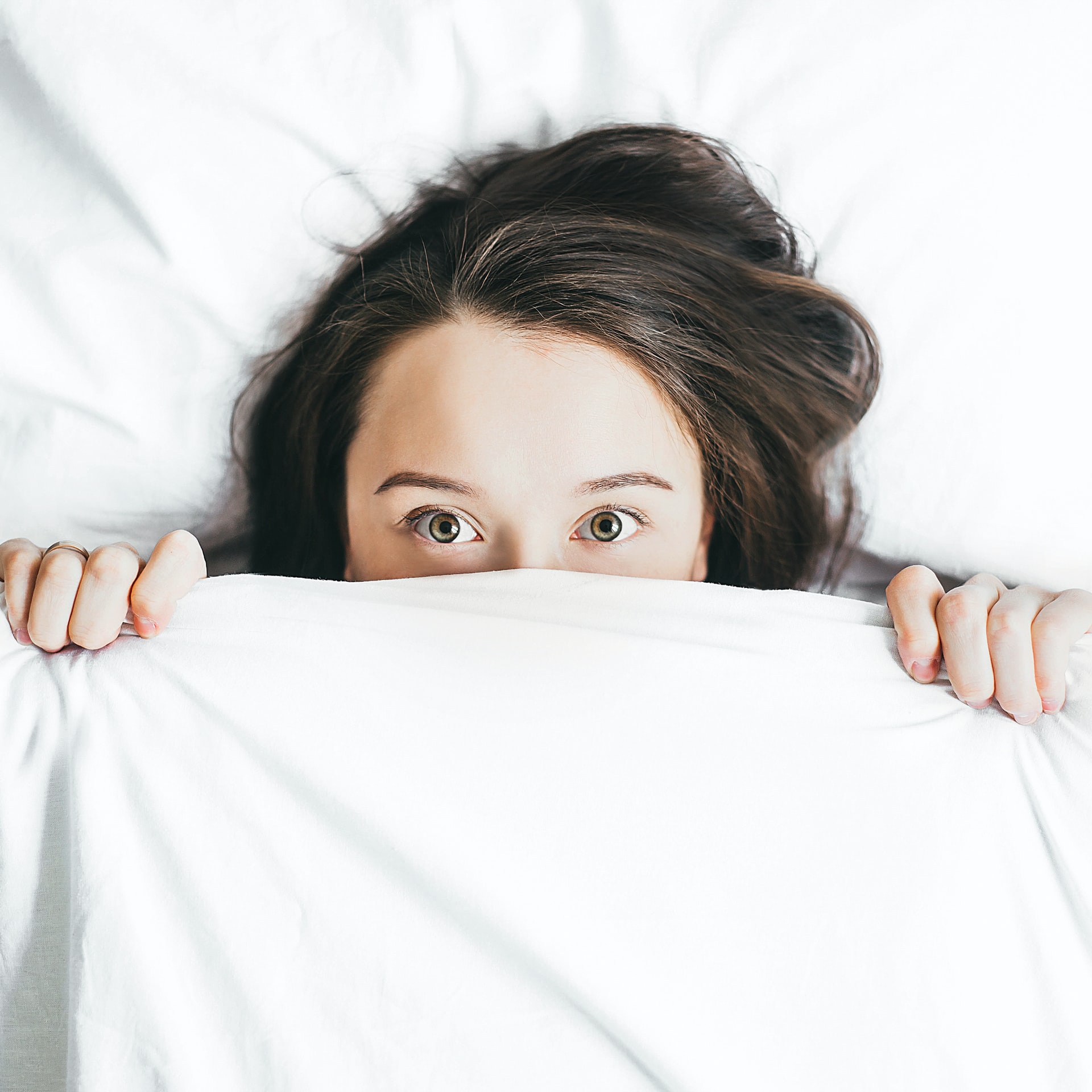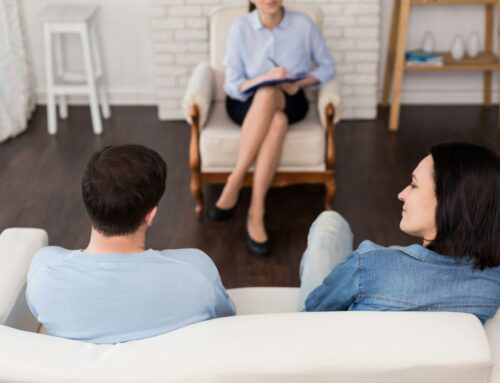Anxiety can present itself in a wide variety of ways. One person may experience insomnia while another tends to pull the covers over their head and sleep all day. One person may tend toward impatient outbursts while another becomes quiet and withdrawn. Even within one person, you can see a variety of manifestations of anxiety, sometimes linked to different situations and sometimes seemingly random.
 Some level of anxiety can actually be helpful. As a reaction to stress or dangerous situations, anxiety can help warn us so we can make decisions accordingly. However, anxiety that persists or extends beyond an isolated situation isn’t beneficial. Over time, anxiety can affect everything from the stress, health, and wellbeing of the individual to his or her relationships, work, and ability to function in society.
Some level of anxiety can actually be helpful. As a reaction to stress or dangerous situations, anxiety can help warn us so we can make decisions accordingly. However, anxiety that persists or extends beyond an isolated situation isn’t beneficial. Over time, anxiety can affect everything from the stress, health, and wellbeing of the individual to his or her relationships, work, and ability to function in society.
Ways to Manage Anxiety
While anxiety may be complex, there are things that can help.
Willingness to Explore
No matter how you experience anxiety, there are practical things you can try to reduce the effects it has on you and your daily life. Unfortunately, these ideas are not something you can try once and declare that they helped or didn’t help. Much like counseling, it requires a willingness to put something into practice over time and evaluate how much it helps.
The best thing you can do is approach these ideas with a posture of exploration. Give yourself permission to try something for a period of time and see how it impacts your overall well-being as well as your anxiety level.
While you may be tempted to put the whole list into practice, start small. Choose one or two tips to implement at a time for two to four weeks and see how you feel. Consider talking with a counselor as you go through the process to help evaluate the strategies that work best for you. Give yourself the gift of exploration for your mental health.
Breathing
 It’s hard to believe something so simple can have such a big impact, but don’t dismiss the power of breathing for anxiety. When we are anxious we tend to take quick shallow breaths. Being intentional about breathing has the ability to help shift you out of that tendency to take slower breaths, making you feel centered and calm.
It’s hard to believe something so simple can have such a big impact, but don’t dismiss the power of breathing for anxiety. When we are anxious we tend to take quick shallow breaths. Being intentional about breathing has the ability to help shift you out of that tendency to take slower breaths, making you feel centered and calm.
A technique like box breathing can reduce stress hormones and blood pressure to help you feel less anxious. There are also apps you can use on your phone or smartwatch to help you take deep breaths that foster a state of calm by moving out of a fight or flight mentality that calms your body and mind.
Get Outside
Much like the simple power of breathing, the outdoors have a positive impact on anxiety. The outdoors, with things like fresh air, sunshine, water, and green living things, all have the ability to help reduce anxiety and depression. Cold or warm temperatures don’t matter. It’s simply getting outside that has a positive effect. Even a few minutes daily of disconnecting from our screen-focused world and getting outside is worth it.
Movement
The benefits of movement on mental health have long been discussed, but some of us are still hesitant to implement this technique. Movement has been proven to do everything from decrease muscle tension to change brain chemistry. Even things we often consider unmeasurable like resilience are built through consistent movement, fostering a stronger, more confident approach to challenging situations and feelings.
The type of movement matters far less than the act of movement. Walking, running, dancing, stretching, and yoga all count. Even chair exercises are an option. The key is to move.
Get Rest
When we are tired, we are more likely to struggle with emotions, especially big ones like fear and anxiety. If you are a person who struggles to get rest, especially during anxious times, think about how you can make rest a priority. What would that look like?
Creating a simple bedtime routine and fostering a healthy sleep environment can help you get those essential nighttime z’s. You may also benefit from finding pockets of rest in your day. Maybe an afternoon nap would help (as long as it doesn’t affect your nighttime sleep.) Perhaps taking a break at lunch to unplug and do something you find relaxing will give your brain a rest from the day. Try these ideas and see how rest helps ease your anxiety.
Drink Water

So much of our day is quickly filled with drinks to keep us going like coffee or soda. Reducing your caffeine intake and increasing your water intake can have a big impact on fostering calmness which can help with anxiety.
Caffeine works against you in two ways, increasing nervousness and decreasing feel-good chemicals. Conversely, water has been shown to have calming properties, which supports your efforts to quell your anxiety.
Eat Good Food
When we feel anxious, comfort foods sound like a good choice. Unfortunately, most comfort foods are full of things like sugar and fat which are not good for our bodies. It is important to remember that every part of our body is impacted by the food we eat, even our brain where so much of anxiety is controlled.
Choose to eat good, healthy foods to support good overall health. Better overall health, especially brain health, helps you navigate anxiety. While diet changes alone cannot cure anxiety, it does give you a better foundation as you work to reduce and manage it.
Journal
Sometimes our anxiety festers because we have so many thoughts and feelings that we never release from our internal thinking. It’s as if we lock our thoughts in our heads, unknowingly creating a breeding ground for anxiety. Getting some of those thoughts out gives us freedom from them.
Journaling is a great way to get those thoughts out. This doesn’t have to be like keeping a diary of every thought and feeling (although it can!). You can write things down daily or a few times per week. You can type them or voice record them. Simply be intentional about unlocking your thoughts and feelings, getting them out of your head to see how it helps ease your mental struggles.
Pray and Read Scripture
Engaging in prayer and reading God’s Word is a wonderful way to express yourself and focus on the power of God. Sometimes we forget that God cares about everything, even the struggles we have that cause our anxiety. But we can come to Him with all things, and He promises to be there.
Prayer doesn’t have to be complicated. You can come up with your own words, read someone else’s prayer or simply be quiet with God, trusting the Holy Spirit to intercede for you. However you choose to pray, you are simply coming to God and allowing Him to show up in His power and grace.
Create Something
 There is something powerful about creating something. Just look at little kids. Outside they turn a stick into an airplane, at the restaurant they’re making a tower of sugar packets, and with a crayon and paper, the possibilities are endless.
There is something powerful about creating something. Just look at little kids. Outside they turn a stick into an airplane, at the restaurant they’re making a tower of sugar packets, and with a crayon and paper, the possibilities are endless.
While art therapy is the fancy, official route you could take, there are simple ways you can create on your own. Cook a meal, work in the garden, put together a puzzle, and sketch on a scrap of paper. Whatever you decide to do, see how the act of working with your hands and engaging your brain in an alternate activity helps diffuse your anxiety.
Be in Community
Sometimes anxiety can draw us to retreat and isolate ourselves in an attempt to control the fears we struggle with or the symptoms of our anxiety. Unfortunately, doing this for a period of time can increase the anxiety we struggle with. Being intentional about interacting with people can help us prevent that isolation.
The best part about this is that there are so many options (even if it feels like there aren’t.) Family, friends, coworkers, support groups, interest groups, and church are some common ways to connect with people. The key is to do what works for you.
If your extended family causes anxiety that wouldn’t be the place to find a healthy community in this season. Maybe a group of friends is a better choice. If large groups are stressful for you, maybe a walking buddy is more helpful. Whatever you choose, it has to be something that works for you rather than against you.
Something to Remember
This is not a one-and-done checklist. This is a process to help you manage and reduce your anxiety. Your willingness to try things, even if it is a little different for you, could lead to the freedom you crave.
“Hiding in Bed”, Courtesy of Alexandra Gorn, Unsplash.com, CC0 License; “Prayer Outdoors”, Courtesy of Rosario Janza, Unsplash.com, CC0 License; “Water”, Courtesy of Brendan Church, Unsplash.com, CC0 License; “Meeting in the Middle”, Courtesy of Shane Rounce, Unsplash.com, CC0 License






